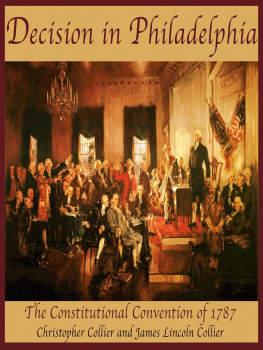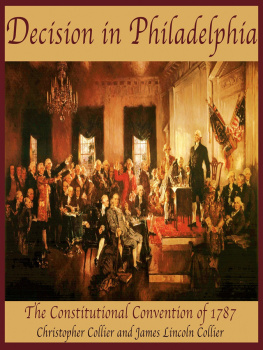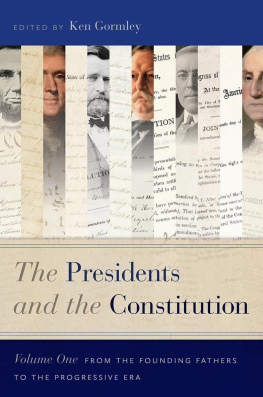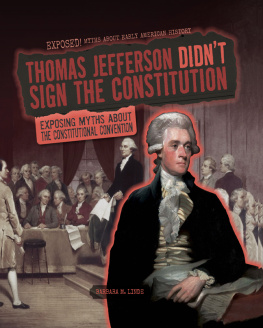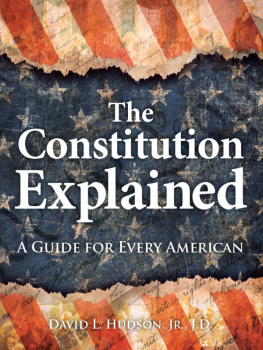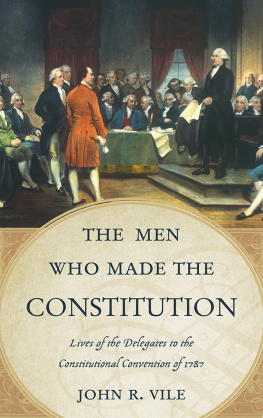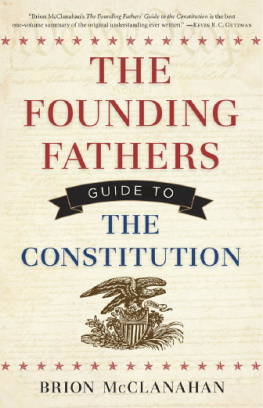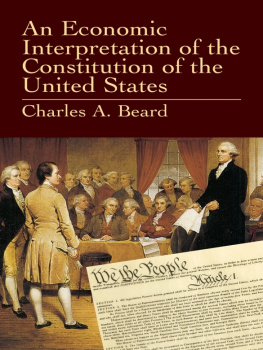DECISION IN
PHILADELPHIA
The Constitutional Convention of 1787
Christopher Collier and James Lincoln Collier
Copyright 1986 by Christopher Collier and James Lincoln Collier
First ebook edition copyright 2012 AudioGO. All Rights Reserved.
Trade ISBN 978-1-62064-195-8
Library ISBN 978-0-7927-9091-4
Cover photo Scene at the Signing of the Constitution of the United States by Howard Chandler Christy, (1873-1952). United States House of Representatives, Washington D.C.
For Diane and Dick Margolis and Lee Lorenz
Praise for
Decision in Philadelphia
The Colliers have written a useful and readable introduction to that most remarkable work.
The Washington Post Book World
Highly recommended... It is the best popular history of the Constitutional Convention available.... Modern readers will find the authors comments on the Constitution particularly interesting, casting many of the Founding Fathers in a new light. Library Journal
A bold, fast-paced narrative... that will appeal to a variety of audiences.
The New York Times Book Review
A fact-filled account of the period that manages, much like the play 1776, to bring alive figures from old oil paintings. The Philadelphia Inquirer
A fascinating study of the talented, bright young men who, with all their foibles, prejudices, and varying temperaments, managed to create history by drafting the Constitution of the United States over one long hot summer in Philadelphia in 1787.Baltimore, Daily Record
A good-spirited, lucid, vigorous book. St. Louis Post-Dispatch
Well organized and lively, providing an engaging popular history of an important epoch.
Cleveland, Plain Dealer
Keeps the reader turning pages the way one might with a good novel... does a wonderful job of reminding us that there is indeed a human, not to say heroic, element in the story of our national origins
Newport News, Virginia, Daily Press
Powerfully written. Richmond, Virginia, News Leader
A fresh view of how our Constitution came about... The book holds ones interest from beginning to end. It reads like a novel, gets to the heart of the matters being discussed, never drags.
South Bend Tribune
Well written. Chattanooga Times
An easy-to-read recounting of the intriguing story of the birth of the document... offers clear insights into the men and what they sought to accomplish. Richmond Times-Dispatch
I have always regarded the Constitution
as the most remarkable work known to me in
modern times to have been produced by the human
intellect, at a single stroke (so to speak), in its
application to political affairs.
WILLIAM EWART GLADSTONE
in a letter to the committee in charge of the
celebration of the Centennial Anniversary of the
American Constitution (July 20, 1887)
Preface
Of all the riches of human life, one of the most highly prized by human beings is freedom. The more of it we have, the more we are able to obtain the satisfaction of our other desires. In this sense freedom is the first requirement, and over the long history of humankind people have shown an astonishing willingness to risk anything, even life itself, in order to be free.
But freedom has proven, over that same long history, to be a very perishable commodity. In the world today only a minority, and not a very large minority at that, have real liberty, as it is understood in the western democracies. The freedom that exists in the United States of America, thus, is a relatively rare thing, something that most people elsewhere long for but do not really expect ever to have. Considering how rare and immensely valuable American liberty is, it is both astounding and dismaying that it should be so much taken for granted, and so little understood. Most Americans have some vague notion that they have certain rightsthe right to say what they want, the right to a fair trial, the right to participate in government and to go to any church they choose, or to none at all. But few Americans have much idea of how their government was so carefully constructed to preserve their freedoms. Most particularly, they do not understand how the Constitution, that rock on which American freedom was built, works, what it means, and why it was put together the way it was. Indeed, even many of our recent presidents have displayed only incomplete understanding of that great document they are sworn to uphold.
This, then, is why we have written this book: to show how the American Constitution was written, and what the men who wrote it were thinking and feeling during what turned out to be a long, hot summer in Philadelphia.
Like any such book, this one was written from a viewpoint. To grossly oversimplify, over the past hundred years or so there have been two basic ways of looking at the Constitutional Convention. Some historians see it as an arena of clashing economic and sectional interests: agriculturalists versus merchants, exporting states versus ones with little export trade, the North versus the South, and so on. The historians who adhere to this interpretation see the Constitution that emerged from the Convention as the result of a whole series of compromises, and compromises of compromises, which gave the document its final shape.
Other historians view the Constitutional Convention mainly as an expression of a consensus on a group of ideals and principles widely held by thoughtful Americans of the day. That is to say, the delegates came to Philadelphia holding a more or less common world view, out of which they wrote the document. The consensus was not perfect, and ideals and ideas had at times to be compromised. But according to this interpretation, there was more agreement than conflict on basic questions of human nature and the relations of society to government in general.
We believe that both these interpretations are in part correct. It is certainly true that compromises between different interests were essential and played a large role in shaping the Constitution. It is also true that the delegates, in general, concurred on many basic philosophic questions. But we think that these two interpretations do not fully explain how the Constitution came to be. As some historians today are beginning to say, no single motivation can adequately explain the behavior of the men at the Conventionor, indeed, of people anywhere. It is our contention that these men were moved not only by economics, sectional loyalties, theories of government, and ideas about life in general, but also by springs and designs hidden deep in their personalities. The tense, quixotic Elbridge Gerry, the personally shy but intellectually bold James Madison, the clever, cautious Roger Sherman, the dogmatic Luther Martin, the brilliant but arrogant Gouverneur Morris, the majestic George Washington, the misanthropic George Mason, the openhanded John Langdon: these were human beings, with their own perceptions of the world and their own ways of dealing with it. We do not believe that we can understand why they voted as they did in Philadelphia solely by knowing where their money came from, or what parts of the country they represented. We believe that to understand how the American Constitution came to be we must know how these men felt about such things as power, liberty, nature, truth, God, and life itself. We are by no means attempting to write what has been called psychohistory, a discipline we view with extreme skepticism. We do think, however, that by examining the record of what these men said and did, we can form estimates of their attitudes and belief systems, and that the evidence will help to explain why they took this or that position on the great issues at the Convention. Our goal, then, has been to show who these Founding Fathers were as well as how their political circumstances operated on their behavior.
Next page
